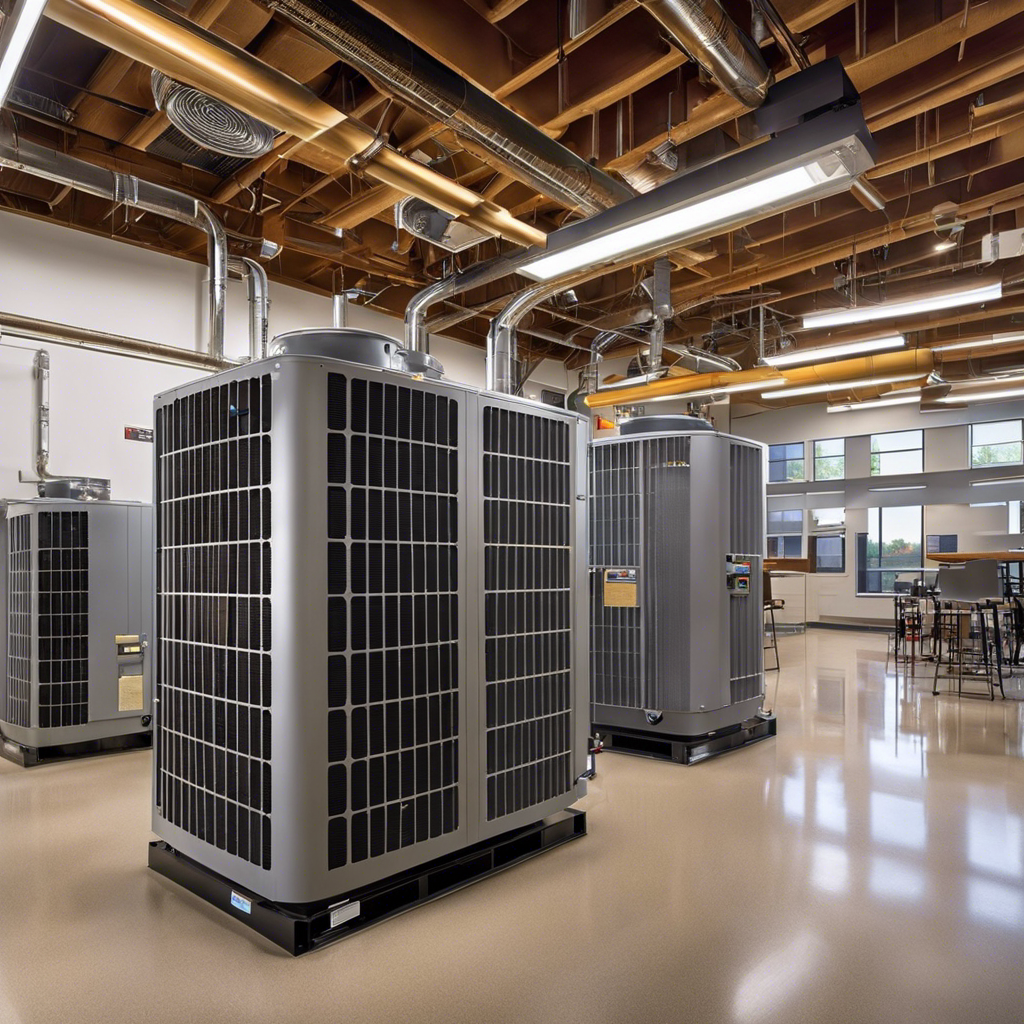Did you know that the average person spends about 90% of their time indoors? That’s a significant amount of time, and it becomes even more crucial to ensure that the indoor air quality (IAQ) in places like schools is of the highest standard.
In Tulsa, schools face unique challenges when it comes to maintaining a healthy IAQ. However, the role of HVAC systems cannot be overstated in achieving this goal.
So, how exactly does HVAC play a crucial role in improving IAQ for Tulsa schools? Stay tuned to discover the importance of regular maintenance, effective air filtration and ventilation strategies, and the benefits of optimizing HVAC systems for IAQ.
Key Takeaways
- Regular HVAC maintenance is crucial for ensuring system efficiency and effectiveness, as well as promoting a healthier learning environment.
- Aging infrastructure and limited budgets pose challenges for maintaining IAQ in Tulsa schools.
- Prioritizing regular maintenance and inspections can help address these challenges and improve IAQ.
- Strategies such as air filtration, ventilation, and energy-efficient HVAC units can significantly enhance IAQ in schools.
Importance of HVAC in IAQ
The HVAC system plays a crucial role in maintaining and improving the indoor air quality (IAQ) of Tulsa schools. Regular maintenance of the HVAC system is of utmost importance for ensuring its efficiency and effectiveness in providing clean and healthy air for the students and staff.
By conducting regular maintenance, such as cleaning filters, checking and repairing any leaks or malfunctioning components, and ensuring proper airflow, the HVAC system can operate at its optimum level, removing pollutants, allergens, and contaminants from the indoor air. This not only promotes a healthier learning environment but also helps prevent respiratory issues and allergies among students and staff.
Moreover, an efficiently functioning HVAC system can also contribute to energy savings, reducing electricity consumption and decreasing the environmental impact of the school.
Therefore, regular maintenance of the HVAC system is essential for ensuring the best indoor air quality and overall well-being of the school community.
Challenges Faced by Tulsa Schools
One major challenge faced by Tulsa schools is ensuring the proper functioning and maintenance of their HVAC systems. These systems play a crucial role in improving ventilation and reducing pollutants in the indoor environment. However, due to various factors, such as aging infrastructure, limited budgets, and lack of trained personnel, schools often struggle to maintain their HVAC systems at optimal levels.
This can lead to poor indoor air quality, which can have detrimental effects on the health and well-being of students and staff. To address this challenge, it’s important for schools to prioritize regular maintenance and inspections of their HVAC systems. This will help identify and address any issues promptly, ensuring that the systems are operating efficiently and effectively.
Additionally, schools should invest in training programs for their maintenance staff to enhance their knowledge and skills in HVAC maintenance. By addressing these challenges, Tulsa schools can create a healthier and more comfortable learning environment for all.
Role of Maintenance in Improving IAQ
Regular maintenance is essential for improving indoor air quality (IAQ) in Tulsa schools. By implementing effective maintenance strategies, schools can minimize the presence of indoor pollutants and provide a healthier environment for students and staff.
One important maintenance strategy is regular filter replacement. Air filters play a crucial role in removing airborne particles, such as dust, pollen, and mold spores, from the indoor air. Over time, these filters become clogged and less effective, allowing pollutants to circulate freely. By changing filters on a regular basis, schools can ensure that the HVAC system is operating efficiently and effectively removing pollutants from the air.
Additionally, routine cleaning and inspection of HVAC components, such as coils and ductwork, can help prevent the buildup of contaminants and maintain optimal IAQ levels. By prioritizing maintenance, Tulsa schools can create a safe and healthy learning environment for all.
Strategies for Air Filtration and Ventilation
Implementing effective strategies for air filtration and ventilation is crucial for maintaining optimal indoor air quality (IAQ) in Tulsa schools.
To achieve this, it’s important to consider the use of air purifiers and ensure energy efficiency in the HVAC system.
Air purifiers play a significant role in removing airborne contaminants, such as pollen, dust, and mold spores, from the indoor environment. By incorporating air purifiers into the HVAC system, they can effectively filter and clean the air, enhancing IAQ.
Additionally, energy efficiency should be a priority when selecting ventilation systems. By choosing energy-efficient HVAC units, schools can reduce energy consumption and costs while providing adequate ventilation.
Properly designed ventilation systems can also promote the circulation of fresh outdoor air, diluting indoor pollutants, and maintaining a healthy learning environment for students and staff.
Benefits of Optimizing HVAC Systems for IAQ
Optimizing HVAC systems for IAQ offers numerous benefits, ensuring a healthier and more comfortable indoor environment for students and staff.
By implementing strategies that improve energy efficiency, schools can reduce their energy consumption and lower utility costs. Upgrading to high-efficiency HVAC equipment, such as variable speed motors and smart thermostats, enables precise temperature control and minimizes wasted energy.
Additionally, optimizing HVAC systems can result in improved air quality, reducing the presence of pollutants and allergens that can cause respiratory issues and allergies among students and staff. This leads to a decrease in absenteeism and an increase in productivity.
Moreover, by optimizing HVAC systems, schools can achieve cost savings through reduced maintenance and repair requirements. Overall, the investment in optimizing HVAC systems for IAQ not only creates a healthier environment but also yields long-term financial benefits.
Frequently Asked Questions
What Are the Specific HVAC Systems Used in Tulsa Schools to Improve Indoor Air Quality?
You really want to know about the specific HVAC systems used in Tulsa schools to improve indoor air quality? Well, let me tell you, proper maintenance of these systems is of utmost importance.
Are There Any Regulations or Guidelines in Place for Maintaining HVAC Systems in Tulsa Schools?
There are regulations in place for maintaining HVAC systems in Tulsa schools. Regular inspections have benefits such as ensuring optimal air quality and comfort for students and staff.
How Often Should HVAC Systems in Tulsa Schools Be Inspected and Serviced to Ensure Optimal Indoor Air Quality?
To ensure optimal indoor air quality in Tulsa schools, it is crucial that you adhere to regular HVAC system inspections and servicing. By doing so, you can guarantee a safe and healthy environment for all students and staff.
Are There Any Additional Measures Tulsa Schools Can Take, Besides HVAC Systems, to Improve Indoor Air Quality?
To improve indoor air quality in Tulsa schools, consider additional measures besides HVAC systems. Implementing IAQ monitoring systems and regular inspections, along with proper ventilation, filtration, and cleaning practices, can greatly enhance the air quality and ensure a healthy environment.
How Do HVAC Systems in Tulsa Schools Contribute to Energy Efficiency and Cost Savings?
You’ll find that HVAC systems in Tulsa schools greatly contribute to energy efficiency and cost savings. Regular inspection and maintenance play a crucial role in ensuring optimal indoor air quality.


